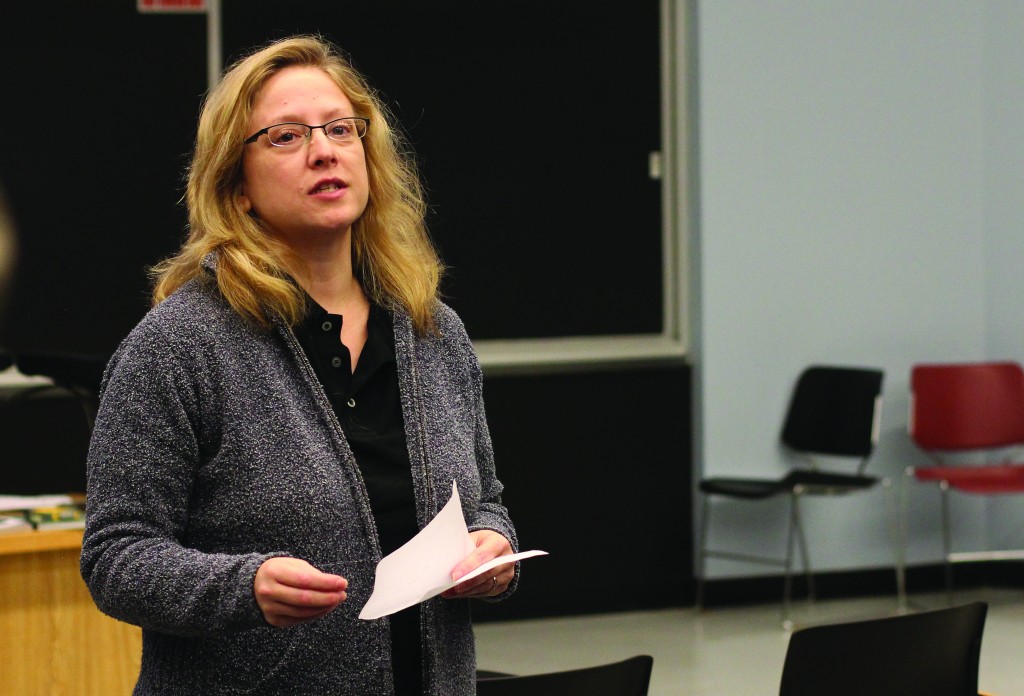
One semester after Binghamton University suspended all pledging, administrators in charge of Greek Life met with new members halfway through the pledging process on Sunday, hoping early intervention and education would mitigate hazing through the rest of the pledging process.
April Thompson, dean of students, focused on how the new members can work to prevent hazing within their organizations. Thompson said they wanted to educate new members about hazing definitions and impacts, high-risk behaviors and how to stand up to hazing and risky expectations.
“I wanted an opportunity to welcome the newest members to our Greek community, give them information about Greek Life, some of our rules and policies, and to also help them to be able to identify and respond to hazing and other high risk activities,” she said.
Despite the extensive efforts taken by the University over the last year, hazing concerns persist, both from parents and Thompson herself.
“We are following up by talking with parents and reaching out to students at events like the one we had tonight,” she said. “NPHC organizations also had an anti-hazing workshop for members tonight, and we are working closely with council leaders.”
Although she admitted the meeting alone might not curb hazing, Thompson stressed the importance of developing a personal connection with Greek members.
“I do not know if it will change pledging, but it is one of many things we are doing to try to improve the student experience,” Thompson said.
Reaching out to students is one of the “creative solutions” she has integrated into traditional enforcement.
“In the past it was all about blunt force and imposing rules and doing whatever they needed to do,” said Zach Stein, president of the Interfraternity Council. “Now they’re trying to enforce the rules but do it while working with students, helping them. And helping them to follow the rules instead of just putting it all on them, which I think is a lot better. It’s a very different approach than what we’ve had.”
Thompson offered students a list of measures to stand up to hazing, such as “talk to someone in the Greek Life Office” and “clearly state that you do NOT want to participate in this activity.”
According to Thompson, these measures are designed “to give them both definitions and skills needed as the newest members of organizations to be empowered, to intervene on their own behalf and the behalf of their brothers and sisters to stop hazing in our community.”
Administrators have conducted similar meetings in the past, but with Greek life under the University and national spotlight, the standard hazing education has taken on added significance this year.
“I know they had one last year, but I think they’re more serious about it now,” he said. “They’re trying to change a lot and these meetings are just the beginning of it.”
Stein suggested pledging is in a period of transformation.
“It’s just going to be safer,” he said. “It’s going to back to basics, back to the values they were founded on. And that’s hopefully the end goal.”
Throughout the meeting Thompson stressed to the pledges how crucial they are to the survival of the organizations, a point of empowerment for them to resist hazing.
“You are the most critically important members of your organizations,” she said. “You hold their futures in your hands. You have more power than you realize and you matter. They cannot survive without you, but you can survive without them.”
Thompson, and Jason Allen, Greek life coordinator, met privately with the pledges following the public portion of the meeting. All non-pledges, including a reporter from Pipe Dream, were asked to leave. Thompson refused to disclose what they discussed during this portion of the meeting.
Pledges leaving the meeting were reluctant to speak with reporters. One student, who wished to remain anonymous, simply said the meeting was “interesting and informative.”


